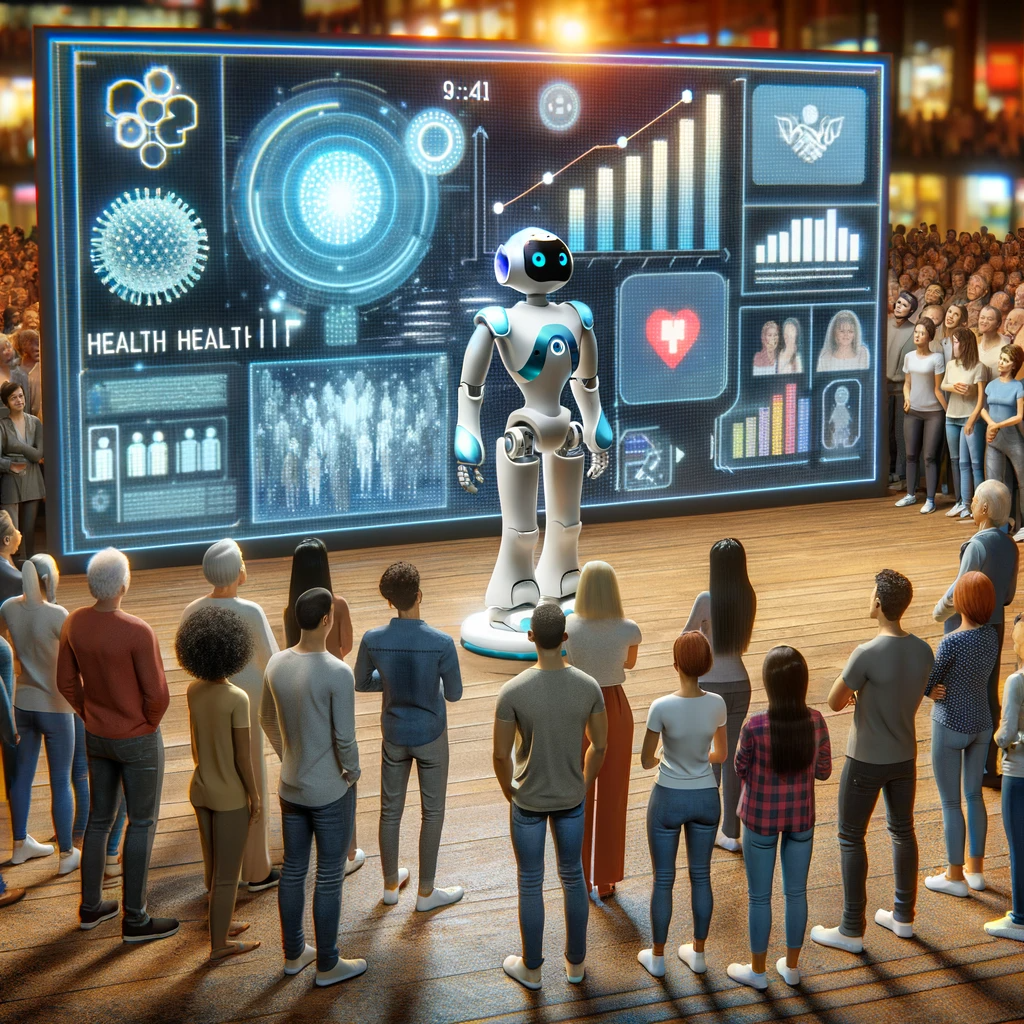In an increasingly interconnected and fast-paced world, the field of public health faces ever-evolving challenges. The effectiveness of public health campaigns, which play a pivotal role in preventing diseases and promoting healthier lifestyles, has become more critical than ever. As populations grow, diseases evolve, and resources remain finite, the need for innovative solutions to enhance the efficacy of public health initiatives becomes evident.
In this age of technological advancement, one beacon of hope emerges – Artificial Intelligence (AI). AI has transcended the realm of science fiction to become an indispensable tool in various domains, including healthcare. Its potential to revolutionize public health campaigns by providing data-driven insights, personalizing interventions, and predicting disease outbreaks is nothing short of transformative.
This article embarks on a journey to explore the symbiotic relationship between AI and public health campaigns. We will delve into the intricacies of how AI, with its unparalleled capabilities in data analysis and predictive modeling, can usher in a new era of more effective and efficient public health initiatives. Through real-world examples, ethical considerations, and a look into the future, we aim to shed light on the remarkable ways AI is poised to enhance the efficacy of public health campaigns.
Join us on this enlightening exploration of the role of AI in shaping the future of public health, as we navigate the intersection of cutting-edge technology and the well-being of societies worldwide.
The Importance of Public Health Campaigns
To comprehend the significance of AI in the realm of public health campaigns, it is crucial to first appreciate the pivotal role these campaigns play in our societies. Public health campaigns are the frontline defense against the spread of diseases, the promotion of healthy behaviors, and the enhancement of overall well-being. They are instrumental in educating communities, mobilizing resources, and mitigating the impact of health crises.
However, the challenges faced by public health campaigns are multifaceted. They must contend with limited resources, the need to reach diverse populations, and the constant evolution of health threats. Traditional approaches often struggle to keep pace with these challenges. This is where the integration of AI, with its ability to process vast amounts of data and provide actionable insights, emerges as a beacon of hope.
The Emergence of Artificial Intelligence
Artificial Intelligence, once confined to the realm of science fiction, has now become an integral part of our daily lives. From voice assistants in our smartphones to predictive algorithms in financial markets, AI’s influence is pervasive. Its core strength lies in its capacity to mimic human intelligence, but with an unmatched ability to analyze data at scale, identify patterns, and make informed decisions.
In healthcare, AI has made significant strides. It has demonstrated its prowess in diagnosing diseases, optimizing treatment plans, and even assisting in surgeries. These achievements in healthcare serve as a testament to the transformative potential of AI, laying the foundation for its application in public health campaigns.
AI in Healthcare
Before delving into the specifics of AI’s role in public health campaigns, it’s essential to understand how AI has already made a profound impact on healthcare. AI-driven diagnostic tools can analyze medical images, detect anomalies, and provide early warnings for diseases. Natural language processing (NLP) algorithms can sift through vast amounts of medical literature to assist healthcare providers in making informed decisions.
Moreover, AI has opened the door to personalized medicine, tailoring treatments to an individual’s genetic makeup and lifestyle. Remote patient monitoring, chatbots for medical advice, and predictive analytics for hospital resource management are among the many applications of AI in healthcare. These achievements highlight AI’s potential to revolutionize the healthcare sector and, by extension, public health campaigns.
AI in Public Health Campaigns
With the groundwork laid for understanding the potential of AI in healthcare, it’s time to explore how AI can be harnessed to enhance the efficacy of public health campaigns. AI’s integration into this domain promises to address several critical challenges and offer new opportunities for achieving public health objectives.
Stay with us as we journey deeper into the ways AI can contribute to more effective public health campaigns, from data analysis and personalized interventions to predictive modeling and targeted communication. In the sections ahead, we will elucidate the practical applications of AI, backed by real-world examples and insights, to showcase how it is reshaping the landscape of public health.
Leveraging AI for Data Analysis
One of AI’s most potent capabilities is its ability to process and analyze vast amounts of data efficiently. In public health campaigns, data is the lifeblood that informs decision-making. AI systems excel at collecting, aggregating, and mining data from diverse sources, including electronic health records, social media, and wearable devices.
Imagine a scenario where AI algorithms sift through millions of health records to identify emerging disease trends or outbreaks. This rapid data analysis enables public health officials to respond swiftly, allocate resources effectively, and implement targeted interventions. For instance, during the COVID-19 pandemic, AI-powered models were used to predict the spread of the virus and optimize the allocation of medical supplies.
Personalized Health Interventions
No two individuals are exactly alike, and their health needs can vary significantly. AI’s capacity for personalization is a game-changer in public health campaigns. By analyzing an individual’s health data, behavior, and preferences, AI can tailor interventions to suit their specific needs.
Consider an AI-powered health app that not only tracks a user’s physical activity but also provides personalized exercise and nutrition recommendations based on their health goals and medical history. Such interventions are more likely to be effective because they align with the individual’s unique circumstances and preferences, increasing compliance and long-term success rates.

Predictive Modeling and Early Detection
In public health, early detection and intervention can be the difference between containment and an outbreak. AI’s predictive modeling capabilities can forecast disease outbreaks by analyzing various factors, including environmental data, population density, and travel patterns.
For instance, AI algorithms can monitor a region’s temperature, humidity, and social mobility data to predict the likelihood of a vector-borne disease outbreak, such as malaria or Zika virus. Public health authorities can then deploy resources and preventive measures proactively, saving lives and reducing healthcare costs.
Targeted Outreach and Communication
Reaching the right audience with the right message is a fundamental aspect of effective public health campaigns. AI can assist in identifying and segmenting target populations based on various factors like demographics, behavior, and health risks.
Imagine a public health campaign aimed at reducing smoking rates. AI can analyze social media and online behavior to identify individuals who are more likely to be receptive to anti-smoking messages. It can then personalize ad campaigns and outreach efforts to resonate with these specific groups, maximizing the impact of the campaign.
In the upcoming sections of this article, we will delve deeper into these practical applications of AI in public health campaigns, providing concrete examples and discussing the ethical considerations that must accompany AI adoption in healthcare. The intersection of cutting-edge technology and public health is rife with potential, and AI is at the forefront of this transformative journey.
Ethical and Privacy Considerations
As we embrace the potential of AI in public health campaigns, it is essential to navigate the ethical and privacy considerations that accompany this transformation. AI’s power lies in its ability to analyze vast amounts of data, but with this capability comes the responsibility to handle data ethically.
Data privacy and informed consent are paramount. Public health campaigns often involve sensitive health information, and individuals must trust that their data will be used responsibly. Ensuring compliance with data protection regulations and maintaining transparency in data handling processes is essential to build and maintain public trust.
Additionally, addressing issues related to data bias is crucial. AI algorithms can inadvertently perpetuate existing biases present in historical data. For example, if historical healthcare data is biased towards a specific demographic, AI models trained on this data may not provide equitable healthcare recommendations. It is vital to continuously monitor and mitigate bias to ensure fairness in AI-driven public health initiatives.
Challenges and Limitations
While the potential benefits of AI in public health campaigns are substantial, it is important to acknowledge the challenges and limitations. Not all regions and healthcare systems have equal access to AI technologies. Resource constraints, particularly in low-income areas, may hinder the adoption of AI-driven solutions.
Furthermore, the accuracy and reliability of AI models depend on the quality and diversity of the data they are trained on. In some cases, data may be incomplete or biased, leading to suboptimal outcomes. These challenges must be addressed through robust data collection and validation processes.
Algorithmic transparency is another concern. It can be challenging to interpret the decision-making processes of complex AI models, raising questions about accountability and responsibility when things go wrong. Striking the right balance between automation and human oversight is a challenge that public health authorities must grapple with.
Future Prospects
The future of AI in public health campaigns holds great promise. As technology continues to advance, AI algorithms will become more sophisticated and capable. Integration with other emerging technologies like the Internet of Things (IoT) and 5G connectivity will further expand AI’s reach and impact.
We can envision a future where AI-powered chatbots provide real-time health advice, wearable devices continuously monitor vital signs and provide early warnings, and predictive models help prevent disease outbreaks before they occur. The synergy between AI and public health campaigns will lead to more resilient and responsive healthcare systems.

Conclusion
In the midst of an ever-changing global landscape, where the health and well-being of entire populations are at stake, the integration of Artificial Intelligence (AI) into public health campaigns emerges as a beacon of hope and progress. This article has journeyed through the intricate web of possibilities, challenges, and ethical considerations surrounding AI’s role in enhancing the efficacy of public health initiatives.
From leveraging AI for data analysis, personalized health interventions, and predictive modeling to enabling targeted outreach and communication, the potential applications are both vast and transformative. AI has already demonstrated its value in healthcare, and its extension into public health campaigns promises to revolutionize the way we prevent diseases and promote healthier lifestyles.
However, as we embrace this transformative potential, it is incumbent upon us to navigate the ethical considerations diligently. Data privacy, bias mitigation, and algorithmic transparency are essential facets of responsible AI adoption in healthcare. Trust and ethical practices must underpin every step of the AI journey in public health.
In the face of resource constraints, regional disparities, and the ever-evolving nature of healthcare challenges, it is imperative that we continue to innovate, research, and collaborate. The future prospects of AI in public health campaigns are bright, with technology poised to become increasingly sophisticated and interconnected.
As we conclude this exploration of AI’s role in public health, we extend a call to action. Let us embrace AI responsibly, harness its capabilities for the betterment of public health, and prioritize equity and ethics in our journey towards a healthier and more resilient world.
Thank you for joining us on this enlightening journey at the intersection of cutting-edge technology and the well-being of societies worldwide.
